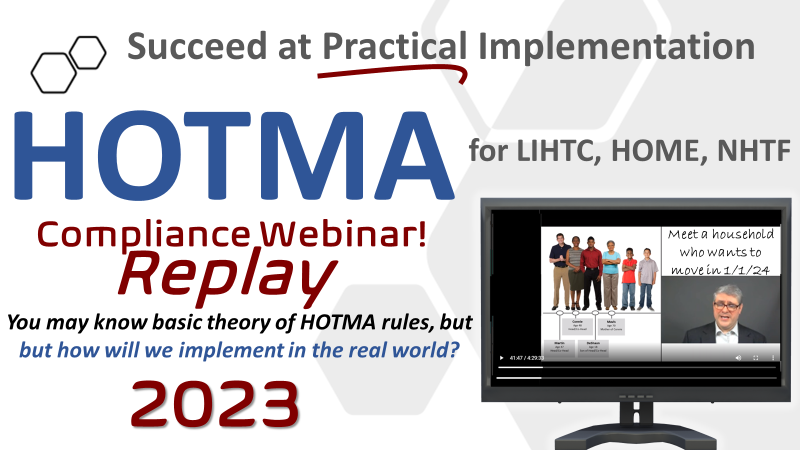Article | HOME-NHTF-LIHTC HOTMA-Related Policy Decisions Agencies Need to Make
Sep 13, 2023
Important Policy Considerations | PHA Verifications for HOME/NHTF/LIHTC Agencies
A careful reading of the HOTMA final rule as it relates to HOME and the NHTF reveals a primary issue that will require a decision on the part of a HOME Participating Jurisdiction (PJ) and will also have implications for LIHTC agencies. It does present an opportunity to align all three programs, and minimize the paperwork burden on all involved, but this will depend on the involved agencies.
A past Q & A on this blog discussed some of the involved issues from another perspective. A reader should feel free to review this information HERE.
Background | HOME & NHTF PHA Verification
Reference | HOTMA § 92.203(a) (HOME) and 93.151(a) (NHTF)
After HOTMA, HOME and the NHTF owners/agents will be required to secure and use the determination of income of any PROJECT-based federal or state subsidy and the PJ will be required to accept these. This means, for instance, that the PJ and the owners/agents must accept the PHA’s determination of income for households receiving project-based vouchers monitored by a PHA and use those determinations of income. The PHAs will have to provide either the household income or a statement that the household is below the income limits applicable to the HOME or NHTF unit. The PHA will not be required to provide actual income numbers, subject to their own policies. There is no discretion on this on the part of the HOME PJ or NHTF grantee, so this will have to be incorporated into PJ and grantee policy.
The “every-sixth-year” verification cycle in HOME will not apply to these households, as the PHA or other subsidy program will be verifying income annually, reducing the burden on the owner/agent and PJ. Once income is determined by the PHA, the owner/agent will simply apply the over-income HOME rules when applicable.
The above will also apply to the NHTF and TENANT-based federal subsidy. This means that the grantee and owner/agents will be required to secure and use the income determination of the PHA for a household benefiting from a Housing Choice Voucher. This will also mean that the owner/agent and grantee must accept either the actual dollar amounts or a statement from the PHA that the household is below the applicable NHTF limits. There is no discretion on this and it will have to be incorporated into grantee NHTF policy.
The “every-sixth-year” rule for NHTF will conform to the project-based rule above.
A crucial decision must be made by PJs, as there is a point of discretion here when it comes to HOME and TENANT-based subsidy households. A PJ is allowed to develop a policy to apply the same standard as the NHTF to tenant-based federally-assisted households. HUD is hoping that this will encourage consistency between HOME and NHTF policies. However, a HOME PJ may choose not to implement this and continue to require source documentation at move-in as well.
The “every-sixth-year” verification cycle in HOME will not apply to these households if the PJ requires the use of PHA determinations of income, as the PHA or other subsidy program will be verifying income annually, reducing the burden on the owner/agent and PJ. Once income is determined by the PHA, the owner/agent will simply apply the over-income HOME rules when applicable.
Question # 1 for PJ consideration (HOME) | Will the HOME PJ require PHA determination of income to be used for voucher-holding households, or continue to require source document verification?
Using PHA determinations will reduce the burden on the owner/agents and encourage alignment with the rules for NHTF units. Also, many PJs' policies already allow for the use of PHA determinations for recertifications. However, PJs may feel that the policy change is too drastic from the past.
Background | LIHTC PHA Verification
Reference | Treas. Reg. (b)(1)(vii)
The LIHTC federal rules have always allowed the use of either a PHA determination of income or a statement from the PHA that the household is below the applicable LIHTC income limits. It appears that HUD used the LIHTC model to set up the wording of the new HOME/NHTF PHA verification model. Some states allow this without restriction, others allow it for recertification, and others do not allow it at all. Additionally, some agencies also require the PHA to disclose household income, though the regulation allows the PHA to simply certify that the household is below the applicable LIHTC limits. Some of this is often because HOME did not allow PHA verifications except at recertifications other than every sixth year of the HOME affordability period and state LIHTC agencies are often also concerned with HOME issues as they are also HOME PJs. Additionally, some states are concerned that LIHTC investors may prohibit this practice.
Question #2 for HFA consideration (LIHTC) | Now that HOTMA has adjusted HOME and NHTF to require the use of PHA verifications for project-based subsidy and allows PJs to require it for voucher-holding households and requires it for NHTF purposes, will the state LIHTC agency allow it for LIHTC reasons.
This would have the effect of aligning all programs, reducing the paperwork burden on owners/agents, and will be in accord with IRS rules. As for concern with whether investors will accept this, that is a matter for LIHTC investor consideration and shouldn’t drive state agency policy, in the opinion of the author. An agency may believe that there is a significant benefit to allowing the PHA verification for LIHTC owners/agents whose investors do not object. Also, most investors only object if there is a risk to the tax credits. As the tax code clearly allows this form of verification, it is only state policy at this point creating risk.
Our most popular HOTMA webinar this year is available as a reply. Click on the image for more information.

There is a very good chance that the topic of this post is covered in an online on-demand course at Costello University.
Stay connected with news and updates!
Join our mailing list to receive the latest news and updates from our team.
Don't worry, your information will not be shared.
We hate SPAM. We will never sell your information, for any reason.






